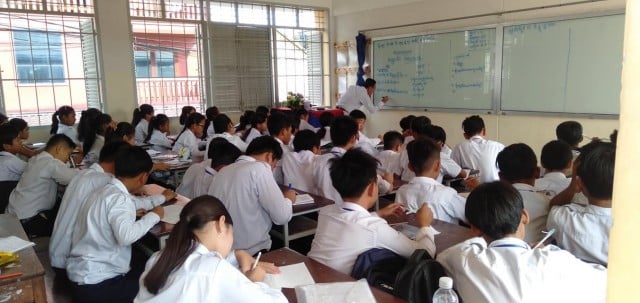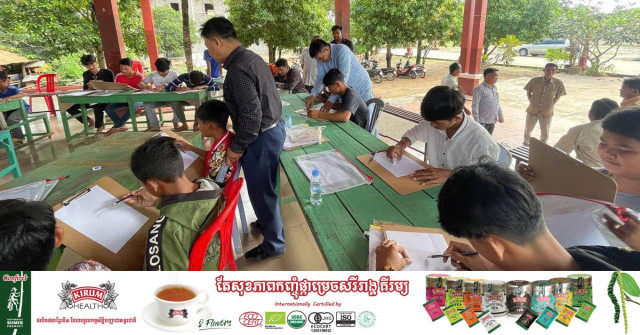More Cambodian Schools Ban Smartphones

- Sao Sokeng
- February 9, 2020 12:32 PM
PHNOM PENH--The number of public schools prohibiting students from using phones in classrooms continues to increase in Cambodia.
Like many other countries in the region, Cambodia has witnessed a smartphone boom over the past years. The smartphone penetration rate has surged to over 117 percent. Half of the population now owns smartphones with phones being used by youngsters under 18 including kindergarteners and high-school students.
Despite its advantages, it is seen as a source of distraction for younger students, and an increasing number of public schools are starting to take action to restrict phone use.
First introduced at the Hun Sen Krong Tep Nimit Pailin High School, regulations to ban smartphone use in classrooms now are implemented at other schools including the Hun Sen Pochentong secondary school in Phnom Penh, the Bun Rany Hun Sen Prey Pon high school in Prey Veng Province, and the Ta Ork high school in Kompong Thom Province.
Oum Maly, principal of the Hun Sen Pochentong secondary school, said that a smartphone ban has been in place for a year at his school, adding that phones are only allowed in the library to do research.
“We decided to ban smartphone use in classrooms last year due to the fact that we noticed that our students used their phones more than they read books,” Maly told Thmey Thmey.
Since then, pupils have shown improvements in terms of discipline as well as using their time studying, he said.
Those violating the regulation will have their phones confiscated and the phones will be returned to their parents or guardians who are invited to the school office.
“With the ban, they no longer dare to use their phones on gaming and other useless stuffs that potentially cause distractions for them,” Maly said. “Despite the fact that they still bring their phones along, they don’t use them.”
A study published in 2015 by the London School of Economics entitled “Ill Communication: Technology, Distraction & Student Performance” showed that students in schools with phone bans tended to obtain better test scores and that the bans benefitted low-performing students the most.
“Restricting mobile phone use can be a low-cost policy to reduce educational inequalities,” the study argued.
Yos Bunthorn, principal of Bun Rany Hun Sen Prey Pon high school in Prey Veng province, said that there have been significant changes in students’ behavior since the imposition of the smartphone ban.
“I observe that they pay more attention to their studies, and the percentage of students passing the exams now tends to be higher than before,” he said during a phone interview with Thmey Thmey.
“An example I can offer here is there were 200 students who took last year high-school exam (Bac II) and only 20 of them failed,” Bunthorn said.
Students are encouraged by the school to use computers and improve their computer skills instead of spending their time on phones, he said.
“As smartphones are prohibited in classrooms,” Bunthorn said, “the school also instructs students to wisely use their phones at home for study purposes.”
School smartphone regulations have so far been endorsed by the public and especially students’ guardians, an indication that the rule should be imposed countrywide to help improve students’ focus and results.
However, there have been some complaints from students who argued that bans would cause more harm than good as they rely on their devices for research and study, for example using them as dictionaries.
The Ministry of Education Youth and Sport said that its instructions on phone use in classrooms issued in 2009 are consistent with the STEM—science, technology, engineering, and mathematics—education program, which primarily aims to increase science literacy among students.
“When there are positive technologies being used in both teaching and learning, we [the ministry] encourage them to do more,” ministry spokesman Ros Soveacha said last week.
“In contrast, if there is any use of technology deemed to be posing negative impacts and defying the ministry’s regulation, each school will have its own approach to deal with students.”















